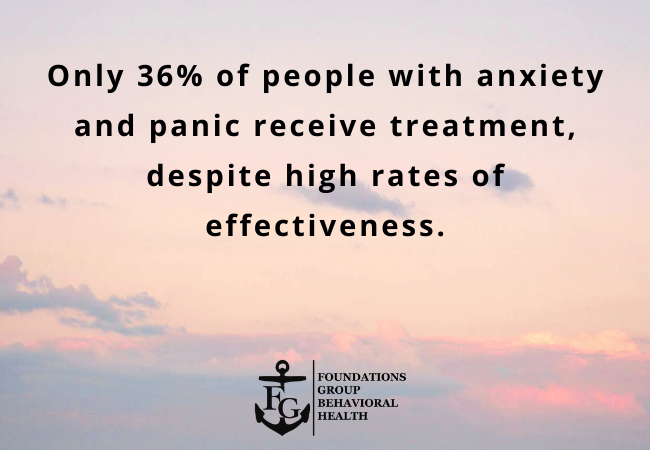Panic attacks can be overwhelming. They can strike without warning, causing intense fear and physical symptoms that mimic heart attacks or other medical emergencies. Many people suffering from panic attacks find themselves stuck in a cycle of anticipatory anxiety — always wondering when the next attack will strike.
This kind of anxiety is debilitating, but it’s also highly treatable. If you’re wondering whether an Anxiety Treatment Program Massachusetts can help, the answer is yes — and more effectively than traditional talk therapy alone.
At Foundations Group Behavioral Health, we specialize in providing evidence-based, compassionate care to individuals facing anxiety, panic disorders, and co-occurring mental health conditions. Through programs like our Psychiatric Day Treatment Massachusetts, Half Day Treatment Program Massachusetts, and Outpatient Mental Health Therapy Massachusetts, we help you understand, manage, and reduce panic attacks — and reclaim your daily life.
What Is a Panic Attack?
Panic attacks are sudden surges of intense fear or distress, often accompanied by physical symptoms like:
- Rapid heart rate
- Shortness of breath
- Chest pain or tightness
- Dizziness or faintness
- Shaking or sweating
- Nausea or stomach pain
- Feelings of unreality (derealization) or detachment (depersonalization)
- Fear of “going crazy,” losing control, or dying
These episodes typically peak within 10 minutes but can feel much longer. While a single panic attack can happen during extreme stress, recurrent attacks may point to panic disorder, a chronic condition that affects millions.
How Panic Attacks Impact Daily Life
Panic disorder and chronic anxiety can cause individuals to:
- Avoid specific places or situations (driving, crowded areas, public speaking)
- Develop agoraphobia — fear of leaving “safe zones”
- Withdraw from relationships, social activities, or work
- Experience ongoing fear of the next attack
- Use substances or compulsive behaviors to avoid panic
Without treatment, this pattern can create a shrinking world — one where fear controls your decisions. That’s where a structured, supportive Mental Health Treatment Program Massachusetts can be a game-changer.
How Anxiety Treatment Programs Address Panic Attacks
An Anxiety Treatment Program is a structured, therapeutic intervention designed to reduce the frequency and severity of panic attacks, teach long-term coping strategies, and treat underlying causes like trauma, stress, or depression.
At Foundations Group Behavioral Health, your care plan may include any of the following evidence-based levels:
Outpatient Mental Health Therapy Massachusetts
Perfect for those with milder panic symptoms or those stepping down from a higher level of care. Treatment includes:
- Weekly or biweekly individual therapy
- Cognitive Behavioral Therapy (CBT)
- Exposure techniques
- Stress-reduction and breathing strategies
- Skills to manage anxiety in everyday situations
Half Day Treatment Program Massachusetts
Ideal for individuals who are still functioning but experiencing frequent panic attacks or life disruption. This program offers:
- Therapy 3–5 days/week for several hours each day
- Group and individual sessions
- Panic-specific skills training (e.g., grounding, interoceptive exposure)
- Medication support as needed
Psychiatric Day Treatment Massachusetts
For individuals whose panic attacks have caused significant impairment in daily life. This is our most intensive outpatient option and includes:
- Full-day therapy sessions (5 days/week)
- Daily clinician support
- Access to psychiatric medication management
- Peer support through specialized therapy groups
- Trauma-informed care if needed
Core Treatment Methods for Panic Attacks
We use clinically proven approaches within all care levels to target the root of panic:
1. Cognitive Behavioral Therapy (CBT)
CBT is the most widely used treatment for panic disorder and focuses on:
- Identifying catastrophic thoughts (e.g., “I’m dying” during an attack)
- Teaching you to reframe fears and examine evidence
- Learning behavioral techniques to break the “fear of fear” cycle
CBT teaches you that panic attacks are uncomfortable, but not dangerous, and gives you tools to reduce both frequency and intensity.
2. Interoceptive Exposure Therapy
This unique form of therapy involves deliberately inducing mild panic-like symptoms in a safe setting to reduce sensitivity to them. Examples include:
- Spinning in a chair to simulate dizziness
- Breathing through a straw to mimic shortness of breath
- Jogging in place to increase heart rate
Over time, this approach desensitizes the fear of panic sensations, helping you respond calmly when symptoms arise in real life.
3. Breathing and Somatic Regulation Techniques
We teach clients how to:
- Use diaphragmatic breathing
- Engage the parasympathetic nervous system
- Reduce muscle tension
- Practice mindfulness and grounding exercises
These tools help you stay anchored during a panic attack, and also prevent future attacks through better baseline regulation.
4. Medication Management
Medication can be a helpful tool in panic treatment when paired with therapy. We offer:
- SSRIs and SNRIs (e.g., sertraline, venlafaxine) for long-term relief
- Benzodiazepines (e.g., clonazepam, lorazepam) for short-term or acute situations
- Ongoing psychiatric evaluations and adjustments
All medication plans are carefully monitored as part of our Behavioral Health Treatment Center Massachusetts approach.
5. Trauma and Co-Occurring Condition Support
Many people with panic disorder also struggle with:
- Past trauma or abuse
- Depressive symptoms
- Social anxiety or OCD
- Substance use (as a self-soothing mechanism)
That’s why we offer integrated care through our Trauma Disorder Treatment Program Massachusetts and Depressive Disorder Treatment Program Massachusetts, ensuring you receive whole-person healing.

Who Can Benefit from a Panic-Focused Anxiety Program?
Our programs are ideal for individuals who:
- Experience recurring, intense panic attacks
- Avoid activities due to fear of triggering panic
- Have developed phobias or agoraphobia
- Can’t function at work or school due to anxiety
- Are tired of living in fear and want tools for long-term relief
Whether you’re a college student missing class due to panic, a parent afraid to leave the house, or a professional who has hidden panic for years — you’re not alone, and recovery is absolutely possible.
Why Choose Foundations Group Behavioral Health for Panic and Anxiety Treatment
Panic attacks can make life feel unpredictable and overwhelming — but you don’t have to face them alone. At Foundations Group Behavioral Health, we specialize in helping individuals overcome panic and anxiety through evidence-based, customized treatment programs designed to promote lasting recovery.
Here’s what sets our care apart:
Tailored Programs for Panic and Anxiety
Our Anxiety Treatment Program Massachusetts is designed specifically for people experiencing frequent panic attacks, anticipatory anxiety, or panic disorder. We use proven methods to treat both symptoms and their root causes.
Multiple Levels of Care That Fit Your Life
Whether you need weekly support through Outpatient Mental Health Therapy Massachusetts, a more structured Half Day Treatment Program Massachusetts, or daily support via Psychiatric Day Treatment Massachusetts, we’ll match your needs with the right level of care.
Integrated Psychiatric and Therapeutic Support
We provide on-site psychiatric evaluations, medication management, and therapeutic care in a coordinated plan so that all aspects of your recovery work together seamlessly.
Support for Co-Occurring Conditions
Many individuals with panic also struggle with trauma or depression. Our Trauma Disorder and Depressive Disorder Treatment Programs Massachusetts ensure comprehensive care for every dimension of your mental health.
Compassionate Experts Who Truly Understand
Our clinical team has helped hundreds of individuals move past panic and rediscover a sense of safety, control, and peace. We listen without judgment and build trust through collaboration.
Conclusion
Panic attacks can feel terrifying and isolating — but they are highly treatable with the right support. You don’t have to live in fear of your next episode. You don’t have to avoid life to feel safe.
At Foundations Group Behavioral Health, we help you understand your symptoms, retrain your mind and body, and build a life where panic no longer holds the steering wheel.
Whether you need occasional therapy or intensive day treatment, we’ll meet you where you are — and walk with you toward where you want to be. Contact us today at 888.685.9730 to begin your healing journey. You deserve to feel calm, confident, and in control again.
FAQ on Anxiety Treatment Programs
Can panic attacks be treated effectively through therapy?
Yes. Evidence-based therapies such as Cognitive Behavioral Therapy (CBT), exposure therapy, and mindfulness-based interventions are proven to help reduce panic attack frequency and severity. These are core elements of our Anxiety Treatment Program Massachusetts.
What makes anxiety treatment programs more effective than standard therapy for panic?
Structured programs like our Half Day Treatment Program Massachusetts and Psychiatric Day Treatment Massachusetts offer more frequent sessions, skills training, psychiatric support, and peer-based learning — all of which accelerate recovery compared to weekly therapy alone.
Do I need medication for panic attacks?
Not everyone needs medication, but many find relief when combining it with therapy. Our psychiatric team provides evaluations and ongoing medication management as part of our comprehensive Mental Health Treatment Programs Massachusetts.
What if my panic attacks are linked to trauma?
We offer integrated care through our Trauma Disorder Treatment Program Massachusetts, using trauma-informed approaches to treat the root cause of panic and anxiety symptoms.
Can I keep working while in treatment for panic?
Yes. Many of our clients choose our Outpatient Mental Health Therapy Massachusetts or Half Day Treatment Program Massachusetts, which are designed to fit around work, school, or caregiving responsibilities.
How do I know if I need a structured program or just outpatient therapy?
If panic attacks are frequent, unpredictable, or interfering with your ability to function, a structured anxiety treatment program may be more effective. We conduct a personalized clinical assessment to determine the right fit.








